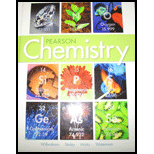
a.
Interpretation : The formula and name of the conjugate base of each Bronsted-Lowry acid are to be written.
Concept Introduction : The adjective conjugate is used to differentiate the reactants from the products of the forward reaction. This word's root is a Latin verb that means "to connect together."
a.
Answer to Problem 84A
The formula and name of the conjugate base are
Explanation of Solution
An ion or molecule that is left over after an acid loses a hydrogen ion is known as a conjugate base.
The given acid is
The acid loses a hydrogen ion which is given below:
The name of it is carbonate ion.
b.
Interpretation : The formula and name of the conjugate base of each Bronsted-Lowry acid are to be written.
Concept Introduction : The adjective conjugate is used to differentiate the reactants from the products of the forward reaction. This word's root is a Latin verb that means "to connect together."
b.
Answer to Problem 84A
The formula and name of the conjugate base are
Explanation of Solution
An ion or molecule that is left over after an acid loses a hydrogen ion is known as a conjugate base.
The given acid is
The acid loses a hydrogen ion which is given below:
The name of it is ammonia.
c.
Interpretation : The formula and name of the conjugate base of each Bronsted-Lowry acid are to be written.
Concept Introduction : The adjective conjugate is used to differentiate the reactants from the products of the forward reaction. This word's root is a Latin verb that means "to connect together."
c.
Answer to Problem 84A
The formula and name of the conjugate base are
Explanation of Solution
An ion or molecule that is left over after an acid loses a hydrogen ion is known as a conjugate base.
The given acid is
The acid loses a hydrogen ion which is given below:
The name of it is iodide ion.
d.
Interpretation : The formula and name of the conjugate base of each Bronsted-Lowry acid are to be written.
Concept Introduction : The adjective conjugate is used to differentiate the reactants from the products of the forward reaction. This word's root is a Latin verb that means "to connect together."
d.
Answer to Problem 84A
The formula and name of the conjugate base are
Explanation of Solution
An ion or molecule that is left over after an acid loses a hydrogen ion is known as a conjugate base.
The given acid is
The acid loses a hydrogen ion which is given below:
The name of it is hydrogen sulfite ion.
Chapter 19 Solutions
Chemistry 2012 Student Edition (hard Cover) Grade 11
 ChemistryChemistryISBN:9781305957404Author:Steven S. Zumdahl, Susan A. Zumdahl, Donald J. DeCostePublisher:Cengage Learning
ChemistryChemistryISBN:9781305957404Author:Steven S. Zumdahl, Susan A. Zumdahl, Donald J. DeCostePublisher:Cengage Learning ChemistryChemistryISBN:9781259911156Author:Raymond Chang Dr., Jason Overby ProfessorPublisher:McGraw-Hill Education
ChemistryChemistryISBN:9781259911156Author:Raymond Chang Dr., Jason Overby ProfessorPublisher:McGraw-Hill Education Principles of Instrumental AnalysisChemistryISBN:9781305577213Author:Douglas A. Skoog, F. James Holler, Stanley R. CrouchPublisher:Cengage Learning
Principles of Instrumental AnalysisChemistryISBN:9781305577213Author:Douglas A. Skoog, F. James Holler, Stanley R. CrouchPublisher:Cengage Learning Organic ChemistryChemistryISBN:9780078021558Author:Janice Gorzynski Smith Dr.Publisher:McGraw-Hill Education
Organic ChemistryChemistryISBN:9780078021558Author:Janice Gorzynski Smith Dr.Publisher:McGraw-Hill Education Chemistry: Principles and ReactionsChemistryISBN:9781305079373Author:William L. Masterton, Cecile N. HurleyPublisher:Cengage Learning
Chemistry: Principles and ReactionsChemistryISBN:9781305079373Author:William L. Masterton, Cecile N. HurleyPublisher:Cengage Learning Elementary Principles of Chemical Processes, Bind...ChemistryISBN:9781118431221Author:Richard M. Felder, Ronald W. Rousseau, Lisa G. BullardPublisher:WILEY
Elementary Principles of Chemical Processes, Bind...ChemistryISBN:9781118431221Author:Richard M. Felder, Ronald W. Rousseau, Lisa G. BullardPublisher:WILEY





